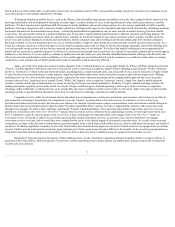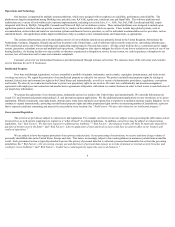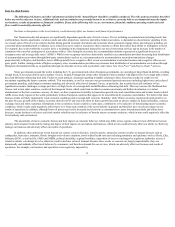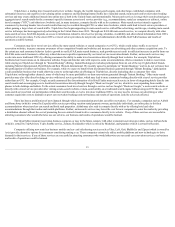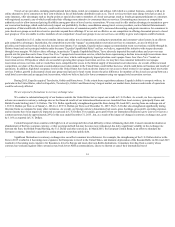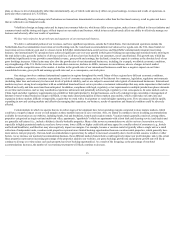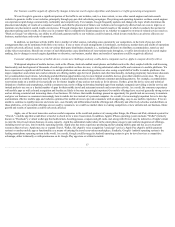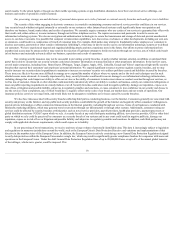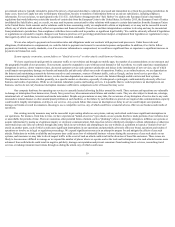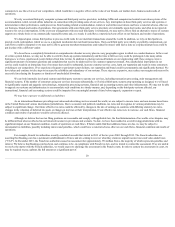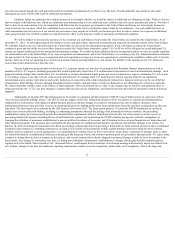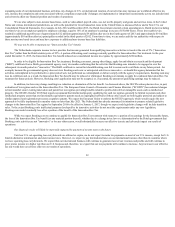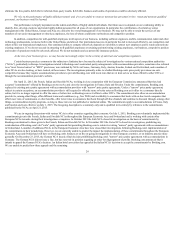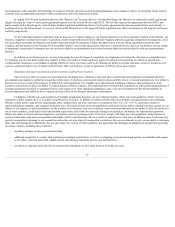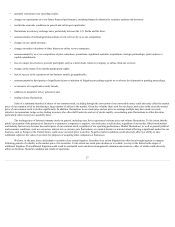Priceline 2015 Annual Report Download - page 20
Download and view the complete annual report
Please find page 20 of the 2015 Priceline annual report below. You can navigate through the pages in the report by either clicking on the pages listed below, or by using the keyword search tool below to find specific information within the annual report.
Our business could be negatively affected by changes in Internet search engine algorithms and dynamics or traffic-generating arrangements.
We use Google to generate a significant portion of the traffic to our websites, and, to a lesser extent, we use other search engines and meta-search
websites to generate traffic to our websites, principally through pay-per-click advertising campaigns. The pricing and operating dynamics on these search engines
can experience rapid change commercially, technically and competitively. For example, Google frequently updates and changes the logic which determines the
placement and display of results of a consumer's search, such that the placement of links to our websites can be negatively affected and our costs to improve or
maintain our placement in search results can increase. If Google changes how it presents travel search results or the manner in which it conducts the auction for
placement among search results, in either case in a manner that is competitively disadvantageous to us, whether to support its own travel-related services (such as
"Book on Google") or otherwise, our ability to efficiently generate traffic to our websites could be harmed, which in turn would have an adverse effect on our
business, market share and results of operations.
In addition, we purchase website traffic from a number of other sources, including some operated by our competitors, in the form of pay-per-click
arrangements that can be terminated with little or no notice. If one or more of such arrangements is terminated, our business, market share and results of operations
could be adversely affected. Lastly, we rely on various third-party distribution channels (i.e., marketing affiliates) to distribute accommodation, rental car and
airline ticket reservations. Should one or more of such third parties cease distribution of reservations made through us, or suffer deterioration in its search engine
ranking, due to changes in search engine algorithms or otherwise, our business, market share and results of operations could be negatively affected.
Consumer adoption and use of mobile devices creates new challenges and may enable device companies such as Apple to compete directly with us.
Widespread adoption of mobile devices, such as the iPhone, Android-enabled smart phones and tablets such as the iPad, coupled with the web browsing
functionality and development of thousands of useful apps available on these devices, is driving substantial online traffic and commerce to mobile platforms. We
have experienced a significant shift of business to mobile platforms and our advertising partners are also seeing a rapid shift of traffic to mobile platforms. Our
major competitors and certain new market entrants are offering mobile apps for travel products and other functionality, including proprietary last-minute discounts
for accommodation reservations. Advertising and distribution opportunities may be more limited on mobile devices given their smaller screen sizes. The gross
profit earned on a mobile transaction may be less than a typical desktop transaction due to different consumer purchasing patterns. For example, accommodation
reservations made on a mobile device typically are for shorter lengths of stay and are not made as far in advance. Further, given the device sizes and technical
limitations of tablets and smartphones, mobile consumers may not be willing to download multiple apps from multiple companies providing a similar service and
instead prefer to use one or a limited number of apps for their mobile travel and restaurant research and reservation activity. As a result, the consumer experience
with mobile apps as well as brand recognition and loyalty are likely to become increasingly important. Our mobile offerings have received generally strong reviews
and are driving a material and increasing share of our business. We believe that mobile bookings present an opportunity for growth and are necessary to maintain
and grow our business as consumers increasingly turn to mobile devices instead of a personal computer. As a result, it is increasingly important for us to develop
and maintain effective mobile apps and websites optimized for mobile devices to provide consumers with an appealing, easy-to-use mobile experience. If we are
unable to continue to rapidly innovate and create new, user-friendly and differentiated mobile offerings and efficiently and effectively advertise and distribute on
these platforms, or if our mobile offerings are not used by consumers, we could lose market share to existing competitors or new entrants and our business, future
growth and results of operations could be adversely affected.
Apple, one of the most innovative and successful companies in the world and producer of, among other things, the iPhone and iPad, obtained a patent for
"iTravel," a mobile app that would allow a traveler to check in for a travel reservation. In addition, Apple's iPhone operating system includes "Wallet" (formerly
known as "Passbook"), a virtual wallet app that holds tickets, boarding passes, coupons and gift cards, and, along with iTravel, may be indicative of Apple's intent
to enter the travel reservations business in some capacity. Apple has substantial market share in the smart phone category and controls integration of offerings,
including travel services, into its mobile operating system. Apple also has more experience producing and developing mobile apps and has access to greater
resources than we have. Apple may use or expand iTravel, Wallet, Siri (Apple's voice recognition "concierge" service), Apple Pay (Apple's mobile payment
system) or another mobile app or functionality as a means of entering the travel reservations marketplace. Similarly, Google's Android operating system is the
leading smart phone operating system in the world. As a result, Google could leverage its Android operating system to give its travel services a competitive
advantage, either technically or with prominence on its Google Play app store or within its mobile
17


